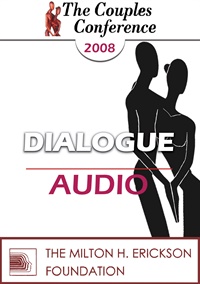
- Average Rating:
- Not yet rated
- Topic Areas:
- Dialogues | Couples Therapy | Neuroscience | Neurobiology
- Categories:
- Couples Conference | Couples Conference 2008 | Pioneers in Couples and Family Therapy
- Faculty:
- Louis Cozolino, PhD | Peter Pearson, PhD | Stan Tatkin, PsyD, MFT
- Duration:
- 57:12
- Format:
- Audio Only
- Original Program Date:
- Apr 27, 2008
- Short Description:
- This panel explores how neuroscience informs couples therapy, including emotional reactivity, stress, and attachment. Presenters discuss using analogies to help clients understand their brain responses and emphasize blending neuroscience with empathy and connection in clinical practice.
- Price:
- $15.00 - Base Price
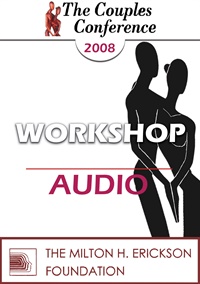
- Average Rating:
- Not yet rated
- Topic Areas:
- Workshops | Conflict | Couples Therapy | Trauma
- Categories:
- Couples Conference | Couples Conference 2008
- Faculty:
- Peter Pearson, PhD
- Duration:
- 2:19:30
- Format:
- Audio Only
- Original Program Date:
- Apr 27, 2008
- Short Description:
- High conflict and chronically distresses add to each others’ trauma while triggering historical trauma. Reducing, calming or eliminating the emotional triggers is an essential part of changing their negative ingrained patterns. See a live demonstration and/or experience a process to bring about immediate relief of painful memories (and sometimes) not even having to talk about them.
- Price:
- $15.00 - Base Price
Tags: Conflict Couples Therapy Trauma
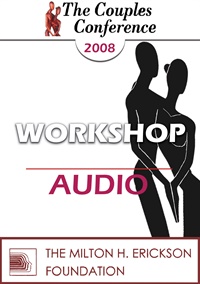
- Average Rating:
- Not yet rated
- Topic Areas:
- Workshops | Couples Therapy | Neuroscience | Intimacy
- Categories:
- Couples Conference | Couples Conference 2008 | Pioneers in Couples and Family Therapy
- Faculty:
- Stan Tatkin, PsyD, MFT
- Duration:
- 2:08:28
- Format:
- Audio Only
- Original Program Date:
- Apr 27, 2008
- Short Description:
- This workshop explores a developmental psychobiological approach to intimacy, showing how the brain’s automatic responses, attachment styles, and arousal levels shape relationship dynamics. It covers how subtle cues like eye contact and microexpressions reveal emotional states, and why co-regulation is key to managing conflict. The approach supports using longer, more frequent sessions to help couples stay connected and repair quickly when things go wrong.
- Price:
- $15.00 - Base Price
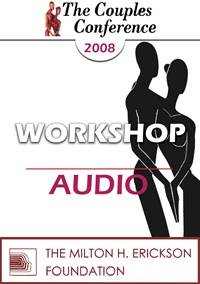
- Average Rating:
- Not yet rated
- Topic Areas:
- Workshops | Couples Therapy | Multicultural | Sex and Sexuality | Intimacy
- Categories:
- Couples Conference | Couples Conference 2008
- Faculty:
- Esther Perel, MA, LMFT
- Duration:
- 2:16:00
- Format:
- Audio Only
- Original Program Date:
- Apr 27, 2008
- Short Description:
- Couples’ expectations about the role of sexuality in intimate relationships have changed dramatically over the past 40 years. We will explore the main ideas of the romantic ideal: how we want our partner to fulfill our needs for connection, belonging and continuity, as well as give the sense of transcendence, mystery and passion. Examining the cultural values of love and respect, freedom and responsibility, and interdependence vs. autonomy, we will map a culturally relevant approach to work with the dilemmas of desire in couples. We also will probe the difference between clearly assigned gender role repartition and the post-feminist egalitarian model.
- Price:
- $15.00 - Base Price
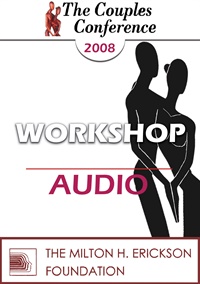
- Average Rating:
- Not yet rated
- Topic Areas:
- Workshops | Addiction | Attachment | Couples Therapy | Personality Disorders | Avoidant | Psychobiological Approach to Couples Therapy (PACT)
- Categories:
- Couples Conference | Couples Conference 2008 | Pioneers in Couples and Family Therapy
- Faculty:
- Stan Tatkin, PsyD, MFT
- Duration:
- 2:24:28
- Format:
- Audio Only
- Original Program Date:
- Apr 27, 2008
- Short Description:
- Avoidant attachment can resemble disorders of the self, such as narcissistic or schizoid presentations, where partners rely heavily on auto-regulation and disengage from mutual emotional attunement. This workshop examines how such dynamics play out in romantic relationships, offering practical strategies—like proximity-based interventions and structured dyadic exercises—to support co-regulation and foster secure relating.
- Price:
- $15.00 - Base Price

- Average Rating:
- Not yet rated
- Topic Areas:
- Workshops | Couples Therapy | Neuroscience | Intimacy
- Categories:
- Couples Conference | Couples Conference 2008
- Faculty:
- Louis Cozolino, PhD
- Duration:
- 2:23:03
- Format:
- Audio Only
- Original Program Date:
- Apr 27, 2008
- Short Description:
- In the course of human evolution, our brains have been shaped by countless adaptational challenges resulting in an organ functioning simultaneously in the conscious present and our primitive and hidden past. This presentation will explore aspects of the human brain which make sustained intimate relationships both possible and problematic.
- Price:
- $15.00 - Base Price
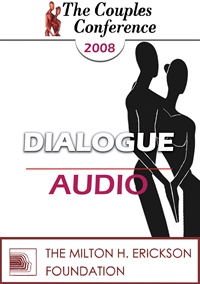
- Average Rating:
- Not yet rated
- Topic Areas:
- Dialogues | Couples Therapy | Differentiation | Therapist Techniques
- Categories:
- Couples Conference | Couples Conference 2008 | Pioneers in Couples and Family Therapy
- Faculty:
- Ellyn Bader, PhD | Esther Perel, MA, LMFT
- Duration:
- 25:31
- Format:
- Audio Only
- Original Program Date:
- Apr 26, 2008
- Short Description:
- Bader and Perel unpack the theory of differentiation, revealing how couples can maintain individual identity while staying deeply connected. Through clinical insights and a revealing film, they challenge misconceptions about differentiation, demonstrating how therapists can help couples navigate interpersonal tensions, maintain curiosity, and grow together without losing themselves.
- Price:
- $15.00 - Base Price
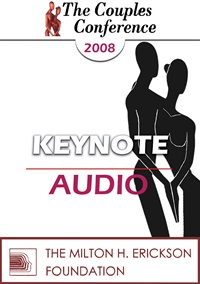
- Average Rating:
- Not yet rated
- Topic Areas:
- Keynotes | Couples Therapy | Love | Sex and Sexuality
- Categories:
- Couples Conference | Couples Conference 2008
- Faculty:
- Otto Kernberg, MD
- Duration:
- 56:57
- Format:
- Audio Only
- Original Program Date:
- Apr 26, 2008
- Short Description:
- This presentation will explore the expression of basic conflicts between love and aggression in a couple’s sexual life, their daily interactions, and their value systems. The analysis of chronic couples’ conflicts will be followed by the outline of an essentially psychoanalytic approach to their diagnostic assessment, and the characteristics of analytic and supportive strategies of treatment.
- Price:
- $15.00 - Base Price
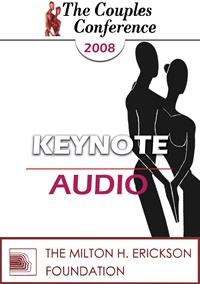
- Average Rating:
- Not yet rated
- Topic Areas:
- Keynotes | Attachment | Couples Therapy | Love | Relationships
- Categories:
- Couples Conference | Couples Conference 2008
- Faculty:
- Sue Johnson, EdD
- Duration:
- 1:00:13
- Format:
- Audio Only
- Original Program Date:
- Apr 26, 2008
- Short Description:
- CC08 Keynote 04 - The Science of Love: Lessons for the Couple Therapist - Susan Johnson, EdD
- Price:
- $15.00 - Base Price
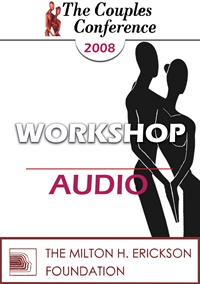
- Average Rating:
- Not yet rated
- Topic Areas:
- Workshops | Couples Therapy | Trauma | Relationships | Treatment Planning | Stress
- Categories:
- Couples Conference | Couples Conference 2008
- Faculty:
- Bessel van der Kolk, MD
- Duration:
- 1:52:49
- Format:
- Audio Only
- Original Program Date:
- Apr 26, 2008
- Short Description:
- Effective treatment of post-traumatic problems needs to include addressing the imprint of trauma on the physical experience of the self as helpless and in danger. Recovery needs to incorporate dealing with defensive efforts that helped ensure survival, incorporate physical experiences that contradict feelings and sensations associated with helplessness and disconnection, as well as an effective way of integrating fragmented memories of trauma. Experiencing physical mastery (as in yoga and specific body based techniques) often is necessary to initiate new ways of perceiving reality and promote new behavior patterns.
- Price:
- $15.00 - Base Price
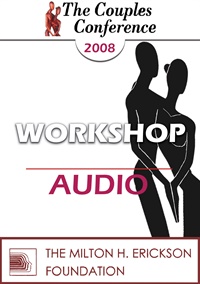
- Average Rating:
- Not yet rated
- Topic Areas:
- Workshops | Attachment | Couples Therapy | Developmental Therapy Model | Differentiation | Therapist Techniques
- Categories:
- Couples Conference | Couples Conference 2008 | Pioneers in Couples and Family Therapy
- Faculty:
- Ellyn Bader, PhD
- Duration:
- 1:41:27
- Format:
- Audio Only
- Original Program Date:
- Apr 26, 2008
- Short Description:
- Bader reveals how therapists can help partners break destructive cycles, manage anxiety, and build deeper intimacy by understanding attachment, differentiation, and relationship growth stages.
- Price:
- $15.00 - Base Price
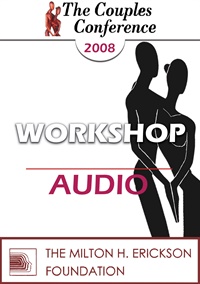
- Average Rating:
- Not yet rated
- Topic Areas:
- Workshops | Couples Therapy | Transference / Countertransference
- Categories:
- Couples Conference | Couples Conference 2008
- Faculty:
- Otto Kernberg, MD
- Duration:
- 2:24:50
- Format:
- Audio Only
- Original Program Date:
- Apr 26, 2008
- Short Description:
- This workshop will summarize the overall technical principles of interpretive intervention in sessions of couples therapy. Economics and dynamic criteria of intervention, analysis of transference and countertransference will be explored together with the setting up of basic frames for the interaction in the sessions. Clinical examples will illustrate these approaches.
- Price:
- $15.00 - Base Price
Tags: Couples Therapy Transference
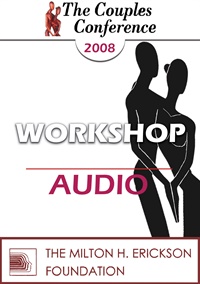
- Average Rating:
- Not yet rated
- Topic Areas:
- Workshops | Emotionally Focused Therapy (EFT) | Trauma | Couples Therapy | Relationships
- Categories:
- Couples Conference | Couples Conference 2008
- Faculty:
- Sue Johnson, EdD
- Duration:
- 2:14:02
- Format:
- Audio Only
- Original Program Date:
- Apr 26, 2008
- Short Description:
- This workshop will offer a theoretical and clinical orientation to the treatment of trauma, personal and relational, in couples therapy. The regulation of emotion and the healing power of attachment events will be emphasized.
- Price:
- $15.00 - Base Price
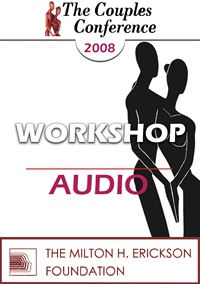
- Average Rating:
- Not yet rated
- Topic Areas:
- Workshops | Couples Therapy | Sex and Sexuality | Intimacy | LGBTQ
- Categories:
- Couples Conference | Couples Conference 2008
- Faculty:
- Esther Perel, MA, LMFT
- Duration:
- 2:00:39
- Format:
- Audio Only
- Original Program Date:
- Apr 26, 2008
- Short Description:
- The story of sex in committed modern couples is one that often tells of a dwindling desire that includes a long list of sexual alibis, claiming to explain the inescapable death of Eros. The absence of fantasy, the proliferation of pornography and affairs, as well as a lack of understanding of the nature of erotic desire all contribute to the predicament. This workshop examines the cultural pressures that shape domesticated sex and the puzzling inverse correlation between greater emotional intimacy and the loss of sexual desire.
- Price:
- $15.00 - Base Price
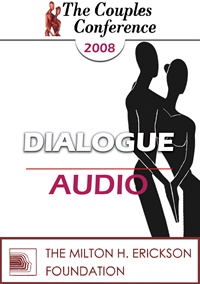
- Average Rating:
- Not yet rated
- Topic Areas:
- Dialogues | Attachment | Couples Therapy
- Categories:
- Couples Conference 2008 | Couples Conference | Pioneers in Couples and Family Therapy
- Faculty:
- Sue Johnson, EdD | Stan Tatkin, PsyD, MFT
- Duration:
- 56:43
- Format:
- Audio Only
- Original Program Date:
- Apr 25, 2008
- Short Description:
- This discussion explores how attachment theory enhances couples therapy by revealing the emotional and biological roots of relationship dynamics. Topics include emotional disconnection as a common cause of affairs, the role of mindfulness and self-regulation, and EFCT’s “softening” process, which helps partners move from conflict toward connection.
- Price:
- $15.00 - Base Price

- Average Rating:
- Not yet rated
- Topic Areas:
- Keynotes | Couples Therapy | Mindfulness | Neuroscience | Attunement
- Categories:
- Couples Conference | Couples Conference 2008
- Faculty:
- Daniel Siegel, MD
- Duration:
- 2:07:07
- Format:
- Audio Only
- Original Program Date:
- Apr 25, 2008
- Short Description:
- Mindful awareness has been scientifically proven to promote social, emotional and physical well-being, and is an effective part of treatment to prevent relapse of drug addiction and chronic depression. Mindfulness also enhances empathy, and in that way may promote healthy interpersonal relationships. This ancient practice of being fully aware in the present moment, without grasping onto judgments, has been found in cultures around the world. At the heart of this proposal is that the state of mindful awareness harnesses specific social and emotional circuits in the brain. The development of these “resonance circuits” creates an integrated brain state that creates the benefits of improved immune and cardiac function, enhanced empathy and self-understanding, and a deeper connection to oneself and others.
- Price:
- $15.00 - Base Price
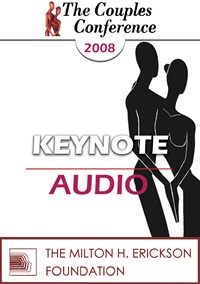
- Average Rating:
- Not yet rated
- Topic Areas:
- Keynotes | Couples Therapy | Trauma | Eye Movement Desensitization and Reprocessing (EMDR) | Hypnosis | Neurobiology
- Categories:
- Couples Conference | Couples Conference 2008
- Faculty:
- Bessel van der Kolk, MD
- Duration:
- 1:05:52
- Format:
- Audio Only
- Original Program Date:
- Apr 25, 2008
- Short Description:
- Starting with a review of recent studies on the neurobiology of trauma, Dr. van der Kolk will examine the utility of approaches from the fields of hypnosis, body oriented therapies and EMDR, both with research data and videotaped clinical interventions. The integration of these approaches during different stages of treatment will be discussed.
- Price:
- $15.00 - Base Price
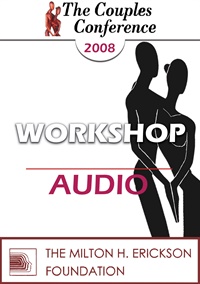
- Average Rating:
- Not yet rated
- Topic Areas:
- Workshops | Assessment | Couples Therapy | Conflict | Sex and Sexuality
- Categories:
- Couples Conference | Couples Conference 2008
- Faculty:
- Otto Kernberg, MD
- Duration:
- 2:27:19
- Format:
- Audio Only
- Original Program Date:
- Apr 25, 2008
- Short Description:
- This workshop will explore the assessment of the functioning of couples in their sexual life, their daily interactions, and their individual and jointly arrived at value systems. The techniques of this assessment, the combination of couples’ and individual partners’ interviews will be followed by an overview of alternative therapeutic strategies.
- Price:
- $15.00 - Base Price
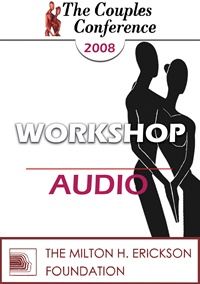
- Average Rating:
- Not yet rated
- Topic Areas:
- Workshops | Trauma | Relationships | Couples Therapy | Neuroscience | Stress
- Categories:
- Couples Conference | Couples Conference 2008
- Faculty:
- Bessel van der Kolk, MD
- Duration:
- 1:38:39
- Format:
- Audio Only
- Original Program Date:
- Apr 25, 2008
- Short Description:
- The majority of people who seek psychiatric care have histories of trauma, chaos or neglect. Advances in the neurosciences, attachment research and in information processing show how brain function is shaped by experience, and that life itself can continually transform perception and biology. Overwhelming experiences alter the capacity for selfregulation and memory processing due to changes in sub-cortical, i.e., “unconscious” levels of the brain.
- Price:
- $15.00 - Base Price
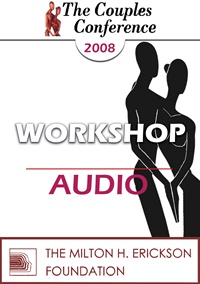
- Average Rating:
- Not yet rated
- Topic Areas:
- Workshops | Attachment | Couples Therapy | Emotionally Focused Therapy (EFT)
- Categories:
- Couples Conference | Couples Conference 2008
- Faculty:
- Sue Johnson, EdD
- Duration:
- 2:39:21
- Format:
- Audio Only
- Original Program Date:
- Apr 25, 2008
- Short Description:
- This workshop will outline the use of attachment theory in the assessment of Relationship problems, setting of treatment goals, creation of change events and moment to moment interventions in emotionally focused couples therapy.
- Price:
- $15.00 - Base Price
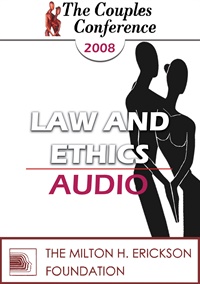
- Average Rating:
- Not yet rated
- Topic Areas:
- Law & Ethics | Therapist Development
- Categories:
- Couples Conference | Couples Conference 2008
- Faculty:
- A. Steven Frankel, PhD, JD, ABPP
- Duration:
- 3:27:00
- Format:
- Audio Only
- Original Program Date:
- Apr 24, 2008
- Short Description:
- The Law and Ethics Workshop covers emerging legal and ethical issues for mental health practitioners of all disciplines. The four-hour program addresses issues including confidentiality and privilege, note-taking, record-keeping, coping with subpoenas, the impact of professional society ethical codes on regulation of mental health practice, liability exposure with suicidal patients, and recent developments in “Tarasoff situations.”
- Price:
- $15.00 - Base Price
Tags: Ethics Law Therapist Development
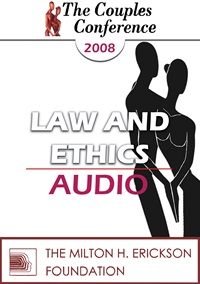
- Average Rating:
- Not yet rated
- Topic Areas:
- Law & Ethics | Therapist Development
- Categories:
- Couples Conference | Couples Conference 2008
- Faculty:
- A. Steven Frankel, PhD, JD, ABPP
- Duration:
- 1:48:58
- Format:
- Audio Only
- Original Program Date:
- Apr 24, 2008
- Short Description:
- This program focuses more closely on the needs of clinicians who fall into particularly high risk groups. Topics include confidentiality and privilege for children, coping with high-conflict divorce/custody families, the regressive impact of the regulatory environment on family therapy in particular, supervision/consultation issues that arise for professionals whose agency positions may include functions that conflict with ethical codes.
- Price:
- $15.00 - Base Price
Tags: Ethics Law Therapist Development

